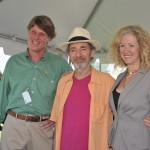
H.J. Bosworth Jr, Harry Shearer and Sandy Rosenthal pose for cameras Aug 23, 2010 after a press conference. Photo/Pat Garin
However, just weeks later, NPR broke that rule big time and interviewed Michele Norris on all four of its shows while she, an NPR host was promoting her book. Not only was this an apparent conflict of interest, it was terrible timing coming on the heels of the Shearer Flap.
And that’s not all. When Mr. Shearer realized he could appear on only one NPR show (Norris got four) he elected to purchase an ad but was denied. NPR claimed the text of Mr. Shearer’s ad was opinion and thus violated FCC regulations. Meanwhile, NPR local affiliates allowed the ad.
It appeared that NPR National didn’t like the information presented by credible experts in The Big Uneasy – that the Army Corps of Engineers was responsible for the New Orleans flooding and that such a disaster could happen again.
Bottom line: NPR’s allowance of Ms. Norris on four shows thoroughly validates the index of suspicion alleged by Mr. Shearer. It appears NPR capriciously denied him airtime, and then capriciously denied the text of his ad.
Here is Mr. Shearer’s take on NPR’s citation of the Dibs rule: “”So maybe you should have consulted said librarian before wholeheartedly buying the “dibs rule” bull***. Obviously, your addendum makes clear that the decision not to cover “The Big Uneasy” on the news shows was purely an editorial judgment, adhering to a rule which is invoked only as a fig leaf.”
And if that’s true, that’s censorship and therefore, abuse of power.
Click here for more on the Mr. Shearer vs. NPR issue.
http://www.huffingtonpost.com/harry-shearer/npr–the-initials-stand-f_b_697670.html
http://www.huffingtonpost.com/harry-shearer/npr-vs-the-big-uneasy-a-q_b_740314.html
http://www.npr.org/blogs/ombudsman/2010/09/15/129883401/harry-shearer-post?ft=1&f=17370252





Leave a Reply